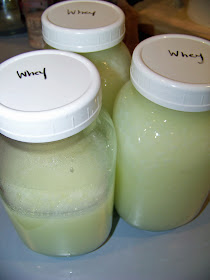 |
| Jennifer and Zach Sartell (This couple is just toooo cute!) |
Why are cheese makers always so nice? It really is amazing. For example, the Sartells from Fenton, Michigan make me smile and I just want to hug them both at the same time- group hug!
Who are they? Well, they're both artists - he sells his hand forged items at their Etsy site and she sells her hand spun yarn and fiber. In addition to that, Zach works at a hospital as a provisional analyst (computer security) and Jennifer writes freelance articles and runs their farm. She raises rare breeds of chickens, bees, Angora goats and dairy goats. And she plays the violin and piano!
So, of course, because they are such cool folks with so many talents, they make their own cheese. I asked Jennifer what they are making:
So far, we have made a simple goat cheese, just by heating the milk and adding apple cider vinegar, and a Queso Blanco using cow's milk in the same manner. We've made the cow's milk 30 Minute Mozzarella several times, it's a big hit! We use the silicone gloves that came with our rotisserie machine to knead the hot cheese, works like a charm.
Once we got our dairy goat Esther, we attempted some of the hard cheeses. We've made three goat's milk Cheddars- each with different amounts and strengths of lipase, a goat's milk Swiss and a goat's milk Parmesan. The Parmesan still has a few months to age before we taste it. After the second Cheddar, we made the delicious Ricotta, it's been our favorite so far! So creamy and a true CHEESE flavor!
This spring we will have 3 does in milk. So we are very excited to have tons of milk to work with in our cheesemaking! Two of the girls that we will be milking are Nubians (Nan and Gretta) and they have a higher butter content than our Alpine, Esther. I'm interested to see how this effects our cheeses. Esther's milk is very mild as far as the goat-y flavor and pretty low in cream content, and as a result, our cheeses have been fairly mild as well.
Jennifer has generously shared her Goat's Milk Ricotta post with us:
 |
| Ricotta made from whey |
Goats Milk Ricotta
By Jennifer Sartell at Iron Oak Farm
Last night we made a second cheddar, this time using lipase to create a stronger flavor.
As promised from my last post, Goat's Milk Cheddar, Our First Hard Cheese, here are some of the photos from our "weight system", The Leaning Tower of ...wait for it...Cheeza! Ha! (Please don't unsubscribe, I'll try to stop...but it's a problem I have, over use of "cheesy" puns...oh no...I did it again...)
 |
| The press with 30 pounds |
 |
| Then 50 pounds |
 |
| Inside the pot, every dumbbell we own |
 |
| Then filled with water, about 50 pounds total |
Anyway, after we made the cheese, we had two gallons of whey (which we stupidly THREW AWAY last time). I cringe now at the thought. Especially after I read all the health benefits of using whey in cooking, feeding it to your dogs, chickens, baking bread, or...best of all...making this delicious Ricotta.
Again, the recipe comes from the Ricki Carroll book Home Cheese Making.
Super, super simple recipe, with absolutely divine results. We didn't use the "Goats Milk Ricotta" recipe because we had used all of Esther's milk for the cheddar and it calls for additional milk to be added to the whey. I wanted cream for coffee in the morning. (priorities right?) So we used the "Ricotta From Heaven" recipe, and let me tell you, it is aptly named.
To make this ricotta, we simply heated the whey until it got an opaque film on the top, about 30 to 40 minutes. Ricky Carroll calls it a "foam" but ours never really appeared that way. (Maybe we did it wrong, but it was so good, I'd do it this way again!)
Then we strained it through a cheese bag.
I salted it, thought the recipe doesn't call for salt, and we were eating it warm by the spoonful. Oh my gosh, hands down BEST ricotta I have ever had!
I kept the whey yet again, and I am planning on feeding it to the chickens. Look for a future Community Chicken's post on whey and chickens.
More Cheese photos below.
 |
| Straining the curd |
 |
| The curds |
 |
| Salting the curd |
 |
| Pouring the curds into the cheesecloth |
 |
| Prepping the mold with wax paper |
 |
| The cheese goes into the mold |
 |
| All the way down |
 |
| Then the top block of the press |
 |
| We use a mason jar as a spacer |
 |
| Unveiling the cheese to be turned and re-dressed |
Iron Oak Farm
Website: http://www.ironoakfarm.blogspot.com





Hi guys I have getting this newsletter for awhile and was so happy to see u in it. I am going to have to visit u guys soon but of course I will let u know ahead of time I am going to make the ricotta tonite of course I don't have weights will think of something
ReplyDelete